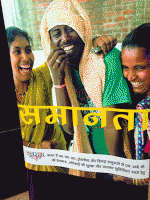Shobha Shukla, Citizen News Service (CNS)

Big push for transgender and hijra welfare
(Image by Citizen News Service - CNS: citizen-news.org) Details DMCA
Aptly titled "India's Big Push for Transgender and Hijra Welfare: Expanding Access to Health, Education and Employment", this solidarity event brought together policymakers, government representatives, media, healthcare providers, civil society and, above all, more than 350 hijras and transgenders from different parts of the country as equal partners to strategize response through community ownership and push for their rights for full access to health, education and employment opportunities.
James Robertson, Executive Director, India HIV/AIDS Alliance, called it a mountain of a movement which nobody could stop. Sharing some of his thoughts with Citizen News Service (CNS) on this momentous occasion, he said: "I have tremendous respect for the community members who are here, and I am very proud to see a strong community empowerment which is much more visible here today than it was there 3 years ago at the 1st Hijra Habba".
"The Supreme Court judgement of 2014 has indeed been a game changer in terms of the way it has allowed transgenders to perceive themselves as individuals, to stand up confidently with their own identity, and to demand their rights and access to services, which was not there before. Today they have a clear agenda for the services they need --having access to education (instead of being thrown out of schools); not being discriminated against while applying for jobs; and being able to avail of general as well as transgender-specific health services".
James did not discount the challenges which the transgenders still face in day to day life. He agreed that societal attitudes do not change simply by changing the law. Unless social attitudes towards transgenders change they will not get the respect they deserve. But with the Apex court on their side, what is now important for the hijra community is to focus on achieving their goals. They need to continue to push for action at the ground level and become more refined in what they are asking for.
A visibly emotional Abhina Aher, Programme Manager of Pehchan Project, asserted that Pehchan is not merely a programme, it is a vision that is helping transgenders find their pehchan (identity). While talking to Citizen News Service (CNS), she gave a snapshot of the arduous journey of their quest for gender justice: "We have traversed a long path during the three years between the 1st Hijra Habba held in 2012 and now this one in 2015. We started with talking about our identity and now we are talking about our rights. The 1st Hijra Habba had just 30 community participants, but we have more than 350 today and we have also managed to bring the Social Welfare Minister to be amidst us. Pehchan has given a face to the community and created a partnership with the government-- this is no mean achievement. We have come a long way".
"When the Pehchan project came, I decided to work for it not only because I wanted to make a difference to my community, but also because I wanted to prove to the world that a transgender can manage and run this huge and challenging programme. At that time, we were still struggling with our identities. People did not know who transgenders or hijras were. In fact they were kept under the umbrella of MSMs (men who have sex with men). Their health interventions were not transgender-specific but designed from the MSM perspective, and even those were not reaching them".
"Today one can see a sea change in their attitude. They are no longer shy of their identity. 60% of the participants here are youth. These are our new leaders of tomorrow. Three years ago I knew only a few leaders from the community. Today I know 300 of them. Stakeholders are now seeing transgenders with respect. And the credit goes to the CBOs (community based organizations) that have worked around transgender issues. Pehchan project alone has created around 14 CBOs around the country, that have reached to more than 50000 transgender population and have built their capacity through leadership training programmes for them. Those who were begging on streets and selling their bodies are now writing proposals and sitting on Community Advisory Boards across the table with stakeholders. Is this not a big achievement?", she said.
(Note: You can view every article as one long page if you sign up as an Advocate Member, or higher).





